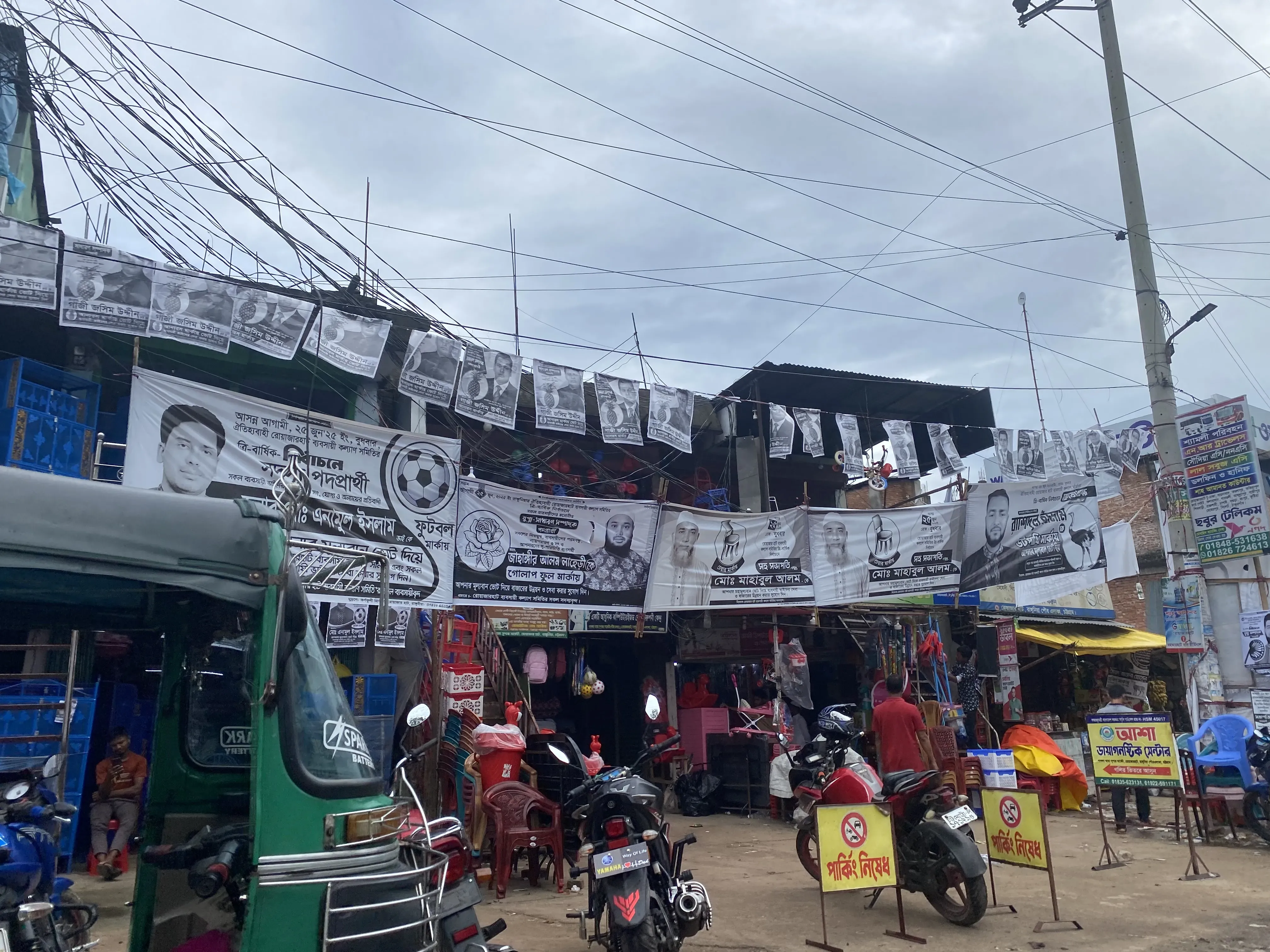
What does a new democracy look like, feel like, sound like? Well, in Bangladesh, which had a student revolution less than a year ago in August 2024, a new chance at democracy is a swirl of contradiction: fear, excitement, pride—and emojis.
I'm driving through Rangunia, a suburb of Chittagong, the second-largest city in Bangladesh. Chittagong pulses with movement: garment workers, new migrants chasing work, and villages clustered just beyond the city’s edges. I'm returning from a day of interviews with rural women, many of whom were hesitant to speak. In today’s Bangladesh—a country brimming with the trembling hope of a new democracy—being open, especially with a foreigner, doesn’t always feel safe.
I have grown used to seeing billboards across urban centers—candidates flanked by Eid Mubarak greetings, hopeful slogans, and polished portraits. But here in Rangunia, the campaign signs lining the central marketplace tell a different story. Faces beam out from massive posters, accompanied not by slogans alone, but by symbols: a pineapple, a chair, a football, a rose, a horse, a bus, a butterfly, a bicycle.
“Pineapple Brand give your valuable vote to serve your business brothers.”
Vote for the “chair mark,” the “man on horseback,” mark your ballot “by [the] bicycle [party],” mark the “football brother,” remember to mark [vote] with [the] “rose flower” party.
Each of these slogans are accompanied by emojis for the pineapple, red rose, bicycle, horse, soccer ball, and others that correspond.
In this relatively young country, these emojis are a tool of political literacy, stitching symbols to people, and politics to memory. The interim government recently announced that nationwide elections will be held in April 2026. Local elections for Rangunia are coming in late June.
While my formal research focuses on the impact of remittances on women, I can’t help but ask everyone I meet—at coffee shops, parties, family dinners—what they think of the new government, the interim administration led by Nobel Peace Prize laureate Muhammad Yunus. It excites me. Unlike the political gridlock in the United States, it seems there is more room for bolstering choice.
The response is nearly unanimous: Yunus is loved. They describe him as kind, dignified, and incorruptible. They adore the traditional outfit he always wears and believe he's guiding Bangladesh in the right direction.
Yet, there is weariness: “The police are still corrupt, it will be awhile until we are developed, until corruption is gone.” The word "corruption" surfaces in nearly every conversation.
“Yunus,” they say, “can’t fix it all—but it is a start.”
Many are eager to share where they were during the student revolution that brought about this moment. A 19-year-old student told me, “I wasn’t allowed outside—it was too dangerous for girls—but my family supported the students. We gave them money, lent them our drivers, our security.”
An 18-year-old said, “I watched it happen right in front of me. I felt so proud. My country.”
And another: “[My parents] wouldn’t let me join, but I marched in the victory parade. We walked through the city all day. They even ransacked the palace—went through her fridge and swam in her pool!”
Telling the same story about the ravaging of the property of Sheikh Hasina—the toppled leader of Bangladesh—another said, “It might sound a bit rancid, but we are passionate people, we were done with her.”
The hope and pride in this new iteration of Bangladesh is pronounced in their smiles as they recall last August. Some have lived through the nation's many identities—from colonial India to East Pakistan to independent Bangladesh. The younger Bengalis are energized by a government that says it wants to reduce corruption, redistribute opportunity, and repair broken systems.
But for all the energy and optimism, there is also fear. Parents tell their daughters not to leave the house alone. “There’s been a rise in rape cases,” they warn me. “Girls have been attacked, kidnapped, stolen from.”
They look at me with concern. “You’re a white girl. A pretty white girl. Western clothes, American accent—even wearing a hijab, you stand out—a foreigner. You will be scammed, you could be hurt.”
This fear stems, in part, from the transitional moment the country is in. With the old government purged and the new one not yet fully in control, many feel there’s a lack of order—a legal and social limbo. Some say people act recklessly now, believing there are no consequences. Others offer a more hopeful interpretation: that what appears to be an uptick in violence is actually an increase in reporting, thanks to the purging of corrupt police and the institution of new procedures.
When I ask Bangladeshis about democracy, their answers often carry a paternalistic warmth: “Bangladesh is getting better,” I hear. “She’s a toddler, still waddling. We’re growing. Local change is happening. But there’s still a long way to go.”
For me, this moment is electric. I’m invigorated by the students who led a revolution and reshaped their government. I’m moved by the pride, the hope, the insistence on imagining a just system. And, yes, my heart swells a little every time I see the emojis, each one a small symbol of a country trying to tell a new story in a new language.








